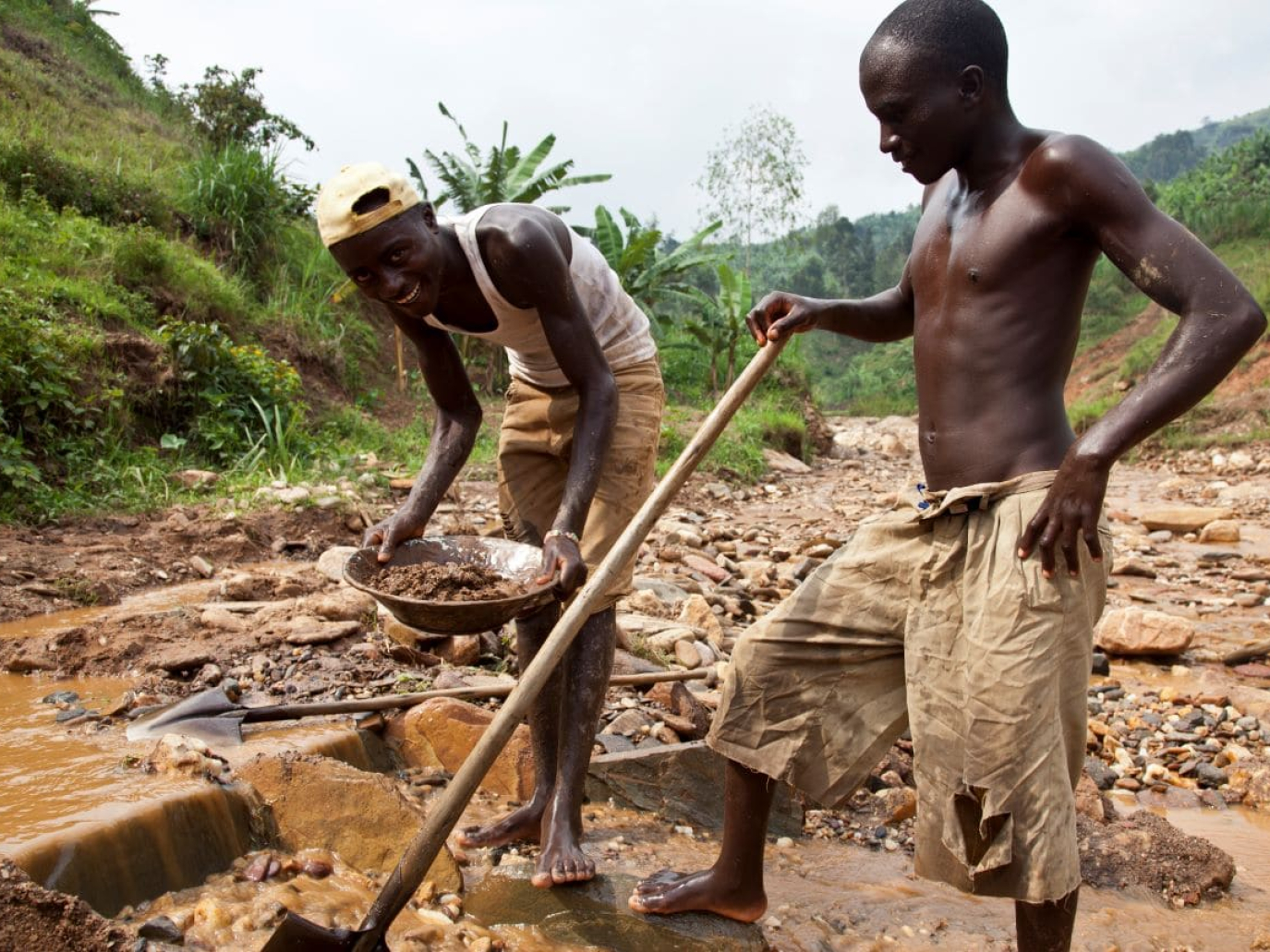
They are called sacrifice zones: territories where the well-being of people and the environment is put on the back burner in the name of the common good. This often happens in Africa, where many of the minerals considered “critical” for the energy transition, indispensable for batteries, wind turbines and solar panels, are extracted. These may be key tools for abandoning fossil fuels, certainly, but their supply chain often hides a paradox: in an attempt to combat climate change, we end up compromising the health, environment and rights of the communities living within the extraction sites.
A just transition, however, is possible. This is the conclusion of the policy brief Reimagining Africa’s Critical Mineral Value Chains: From Extraction to Equitable Green Industrialisation in a Multipolar World, compiled by experts from Power Shift Africa and the climate think tank ECCO. The document, developed as part of the T20, the research and analysis group that provides proposals and recommendations to the G20, calls on African countries and their international partners to rethink the entire critical minerals supply chain, from extraction to processing, so that it becomes a driver of sustainable industrialisation, economic diversification and the creation of added value at the local level.
“Our work is part of a broader reflection on the partnership between Europe and Africa, specifically on how international cooperation can contribute to a just and sustainable energy transition in the African continent,” Lorena Stella Martini, senior foreign policy analyst at ECCO and co-author of the policy brief, tells Renewable Matter.
Africa’s resources
The African continent accounts for around 30% of the world's mineral reserves, including many of the critical raw materials needed for the energy transition. As noted in the International Energy Agency (IEA) Critical Mineral Outlook, Africa currently accounts for 11% of global lithium production and 17% of copper production, while nearly three-quarters of the world's cobalt comes from the Democratic Republic of Congo. However, most of these minerals leave the continent in their raw state, with little or no added value. In 2024, the total market value of Africa's main energy mineral production reached approximately $50 billion for extraction, but only $16 billion for refining.
This topic was among the priorities of South Africa's G20 presidency, which will end in November. President Cyril Ramaphosa emphasised the need to transform Africa's mineral wealth into a motor for inclusive and sustainable development. “We need a G20 framework on green industrialisation and investments to ensure progress towards a grand bargain that promotes value addition to critical minerals close to the source of extraction,” stated Ramaphosa. “As mineral extraction accelerates to match the needs of the energy transition, the countries and local communities endowed with these resources must be the ones to benefit the most.”
As highlighted in the T20 policy brief, Africa already avails of strategic frameworks to guide its mining and industrial strategy, such as the Africa Mining Vision (AMV) and the Africa Green Minerals Strategy. However, these tools remain largely unimplemented, hampered by weak governance, policies often driven by elites, and poor integration into global trade mechanisms.
The risk, the authors warn, is to reproduce the old extractive models of the past, rather than building new, fairer and more sustainable ones. A signal in this direction comes from initiatives such as the Lobito Corridor or the agreement on critical minerals between the European Union and Namibia: projects which, while offering interesting prospects, show how limited the continent's capacity still is to set the terms of cooperation independently.
From capital to cooperation to create value
At this point, a question arises: how can the African critical minerals mining sector be transformed, from extraction to processing? According to the authors, the first step is to focus on a regional industrial policy with local value addition. This would promote cooperation between African countries rich in critical minerals and reduce the risk of harmful internal competition, as also highlighted in the Africa Mining Vision.
In order to pursue this approach, it is essential that the G20 supports the African Union, both diplomatically and substantively, so that the statutes of the Africa Minerals Development Centre, the agency responsible for implementing the AMV, are ratified. So far, it has only been ratified by Guinea, Mali, Zambia and Nigeria, and needs to be signed by at least 11 other states in order to be implemented.
“We must not limit ourselves to exporting raw materials, but foster the creation of regional value chains capable of generating employment, skills and industrial development locally,” continues Martini. “This means promoting the participation of local businesses, suppliers and labour, local content requirements for investments, creating jobs, strengthening governance in the mining sector. All this so that African countries are provided with effective tools to manage their resources, and to promote shared environmental and social standards that ensure a sustainable transition.”
The second element required to transform the African mining sector is governance that centres on local communities. This is not just a matter of involving them in decision-making, but also of ensuring that they are the main beneficiaries of critical mineral extraction. In this sense, the principle of free, prior and informed consent, also enshrined in the United Nations Declaration on the Rights of Indigenous Peoples, is a fundamental guide for engaging with local communities.
To maximise local benefits, policies can be introduced to encourage the processing of minerals close to extraction sites, creating jobs, stimulating economic diversification and enhancing the added value generated locally. At the same time, it is essential to strengthen safeguards for workers in the sector, guaranteeing rights, safety and decent conditions.
Another key element is the transformation of global industrial financing mechanisms and agreements to facilitate the transfer of technology and expertise to African nations, enabling them to support green industrialisation and process minerals locally. “First and foremost, private sector investment is needed. But attracting it requires a political and regulatory framework that facilitates its operation,” explains Lorena Stella Martini. “That is why partnerships between Europe and African countries must include mechanisms that build trust and reduce risks for investors.” Among the priorities identified in the policy brief are technical training, local skills development and access to advanced technologies. However, the authors stress that all these aspects must be integrated into existing regional frameworks, such as the African Continental Free Trade Area.
Finally, the challenge also concerns how Europe will build its economic relations with Africa. Cooperation based on common standards for secure and sustainable supply chains is crucial not only for the future of the African continent, but also for that of the European economy.
“The Global Gateway Forum is being held in Brussels in these days, where the progress of the European initiative and the framework for cooperation between the EU and partner countries, particularly African ones, will be discussed,” concludes Martini. “Compared to other global players such as China, Europe has its own model of cooperation with African countries. Its strength lies in its ability to focus on creating local value in the field of critical minerals for the energy transition. The goal, therefore, should not be simply to extract resources, but to build an economy around them that generates sustainable development.”
Cover: photo Envato



